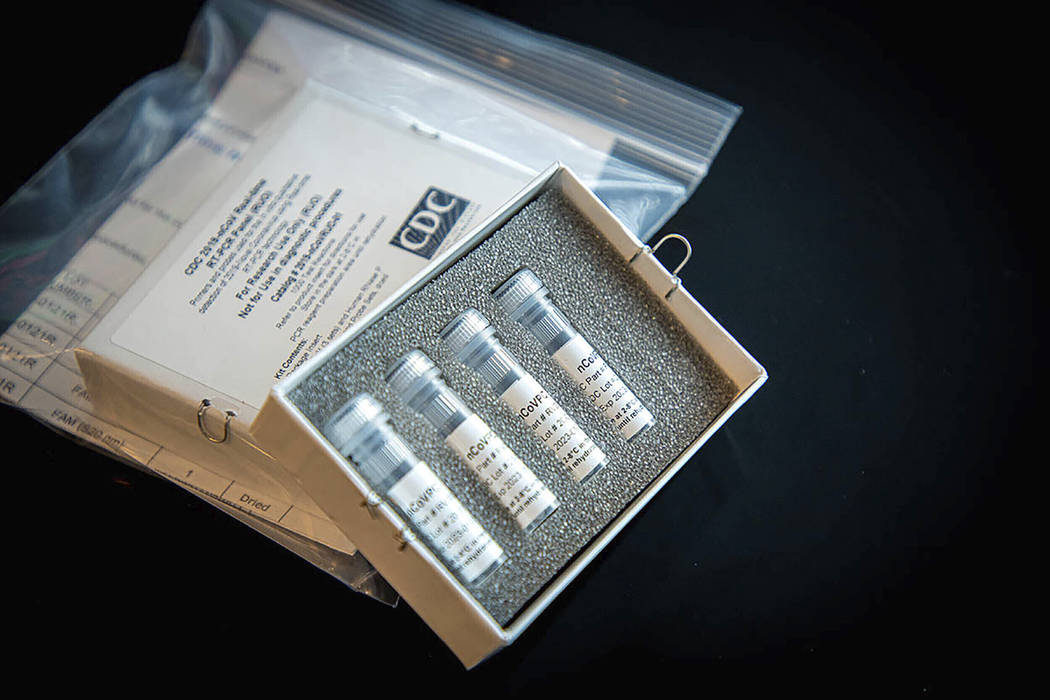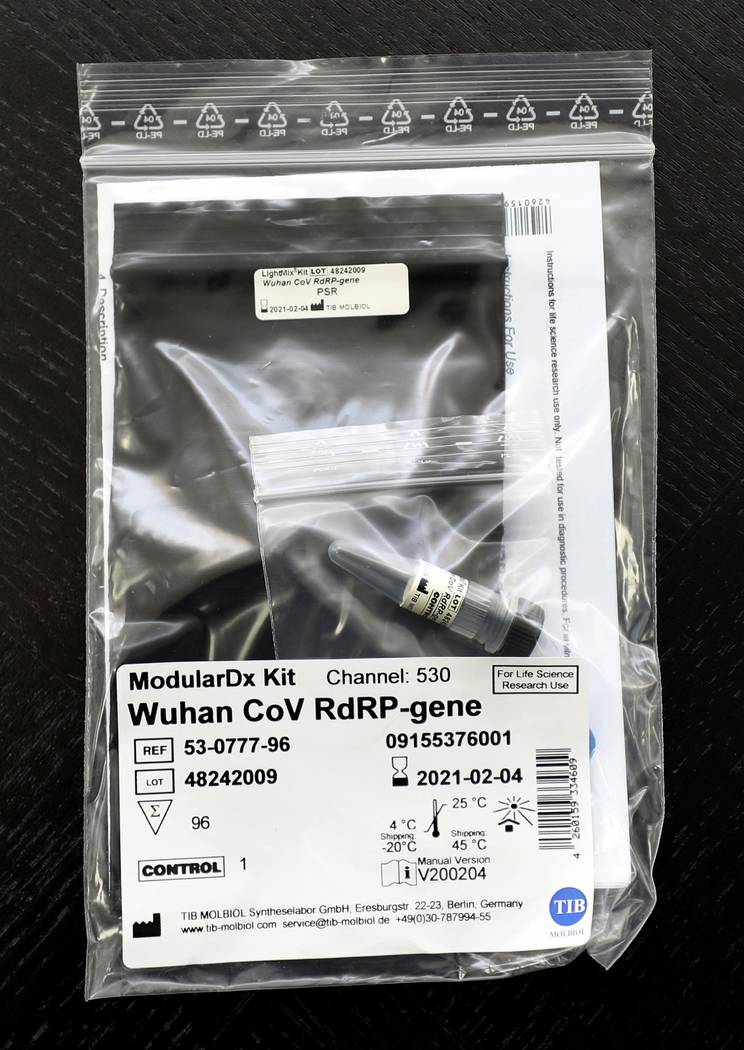Coronavirus testing bottleneck in Nevada may be easing
A 34-year-old Clark County school teacher stayed out of the classroom all last week, she said, for fear of infecting her students with the new coronavirus.
The teacher does not know whether she has the virus. She has experienced shortness of breath, a cough and fever, symptoms of both the flu and COVID-19, the illness caused by the new coronavirus that emerged out of China.
Doctors told her that a rapid influenza test came back negative for the flu, but that she didn’t have bacterial pneumonia. They said she should request a test for COVID-19 at an area hospital if her symptoms got worse.
But when she went to an area emergency room on Wednesday, she was told she didn’t meet the criteria for testing because she hadn’t traveled to a hot spot for the illness.
“No wonder the state didn’t have any cases. They’re not testing people,” said the teacher, who said her symptoms had improved some by Friday. She asked that her name not be used because she did not have permission to speak with a reporter and feared losing her job.
As of Tuesday, just 14 people in Nevada had been tested for the new coronavirus, according to the website of the Nevada Department of Health and Human Services. The low number is due to several factors, including limited testing capability, testing criteria that limited testing to those who had traveled to the disease epicenter in China, and the fact that no person-to-person transmission had been documented within the state.
But health experts said Friday they expect wider testing to begin now that two Nevadans have tested positive for the coronavirus. New criteria for testing released last week by the federal Centers for Disease Control and Prevention and an expanding capacity for testing in both the public and private sectors also should help eliminate any bottleneck.
Wider testing could play an important role in understanding and treating the disease, they said.
“If this disease becomes widespread, that’s something the clinicians in this community absolutely need to be able to do,” said Brian Labus, an assistant professor of epidemiology and biostatistics at UNLV’s School of Public Health.
Testing for the coronavirus should become as widespread as testing for the flu “if the coronavirus becomes as widespread as the flu,” he said.
More testing
When the U.S. reported its first cases of the virus in late January, only the CDC could test for the virus. Testing was initially limited primarily to people who’d traveled to the disease epicenter in China, who seemingly were the only people getting sick.
Testing capability also was limited, which meant that public health authorities couldn’t just “blindly test people” without running out of tests right away, Labus said.
That meant that testing was reserved for those who were sickest. “I think the guidance is trying to be conservative and make sure we have the tests for cases we really need to have answers to,” said Dr. Amy Stone, an immunologist and assistant professor of microbiology at Touro University Nevada in Henderson.
“I know they’re trying to be strict on criteria and there are probably more cases out there,” Stone said, noting that most people with COVID-19 have had mild symptoms and would not meet testing criteria.
After a period of trial and error, state and local laboratories began to receive test kits so that they could conduct testing themselves. The Nevada State Public Health Lab said it has had the capability to test since Feb. 11. The Southern Nevada Health District, which in the past week received test kits, currently has the capability to conduct 800 tests, a spokeswoman said Friday.
But Nevada’s U.S. Sens. Catherine Cortez Masto and Jacky Rosen, both Democrats, sent a letter to Secretary of Health and Human Services Secretary Alex Azar on Friday to support Gov. Steve Sisolak’s request for additional tests kits for the state “to ensure that our public health agencies can respond quickly and appropriately to this evolving situation.”
Private laboratories LabCorp and Quest also announced last week that they will begin to test for the virus.
“I think there’s definitely an issue with the number of test kits that we have” across the country, said Dr. Evelyn Montalvo Stanton, chair of pediatrics at the UNLV School of Medicine, adding that Las Vegas-area hospitals are equipped to do testing but some may not have enough kits to do so widely.
“Now that we have LabCorp and Quest, I think that would be a big help,” she said.
She noted, however, that testing by the public laboratories is free to the patient, which may not be the case with testing through private labs.
New testing criteria
New guidelines from the CDC for testing give doctors more discretion in terms of who gets tested. The guidance states in part, “Clinicians should use their judgment to determine if a patient has signs and symptoms compatible with COVID-19 and whether the patient should be tested.
“Decisions on which patients receive testing should be based on the local epidemiology of COVID-19, as well as the clinical course of illness. Most patients with confirmed COVID-19 have developed fever and/or symptoms of acute respiratory illness. … Clinicians are strongly encouraged to test for other causes of respiratory illness, including infections such as influenza.”
A physician’s evaluation should include asking a “battery of questions to know what might be pertinent or going on in any given place” that a patient has visited, said Dr. Neil Gokal, a family physician with Southwest Medical Associates.
Beyond testing, “We also are relying on our physicians’ clinical judgment and acumen” in making a diagnosis, Gokal said.
If a patient is suspected of having COVID-19, the UNLV School of Medicine has a protocol in place by which it will contact the infectious control team at University Medical Center before sending a patient to be treated in the emergency room.
The school of medicine’s pediatric practice has not had such a case yet, Montalvo Stanton said.
Unlike the flu, which can be treated with anti-viral medication, there is no specific treatment for COVID-19. However, “Doctors still need to know what they’re dealing with” to take appropriate action and precautions, Labus said.
From a public health perspective, authorities will want to know how widespread the illness is, and how severe.
Authorities will want to see what populations are getting sick from COVID-19, “so that we can look at how it’s actually spreading in our community,” Labus said.
Contact Mary Hynes at mhynes@reviewjournal.com or 702-383-0336. Follow @MaryHynes1 on Twitter.
Who should get tested
The CDC last week revised its guidelines on who should be tested for coronavirus infection, saying additional clinical laboratories performing tests authorized by the Food and Drug Administration should widen the group of symptomatic patients who can be tested.
The new guideline is general, leaving medical professionals considerable leeway to determine who gets tested and who doesn't.
The new guidance says in part:
"Clinicians should use their judgment to determine if a patient has signs and symptoms compatible with COVID-19 and whether the patient should be tested. Decisions on which patients receive testing should be based on the local epidemiology of COVID-19, as well as the clinical course of illness. Most patients with confirmed COVID-19 have developed fever1 and/or symptoms of acute respiratory illness. … Clinicians are strongly encouraged to test for other causes of respiratory illness, including infections such as influenza.
"Epidemiologic factors that may help guide decisions on whether to test include: any persons, including healthcare workers2, who have had close contact3 with a laboratory-confirmed4 COVID-19 patient within 14 days of symptom onset, or a history of travel from affected geographic areas5 (see below) within 14 days of symptom onset."












































